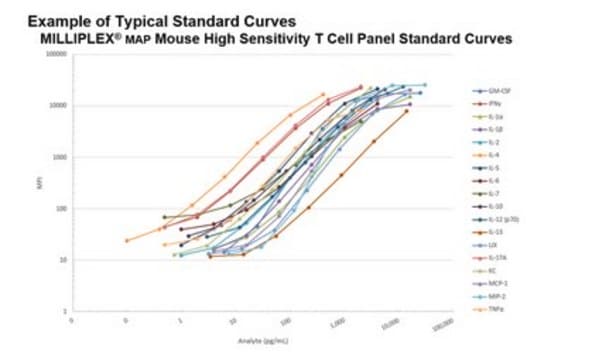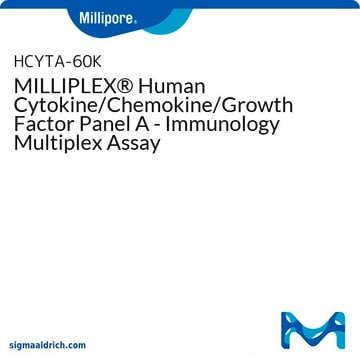HKI4MAG-99K
MILLIPLEX® Human Kidney Injury Magnetic Bead Panel 4 - Toxicity Multiplex Assay
The analytes available for this multiplex kit are: EGF, FABP1, IP-10, KIM-1, Osteopontin (OPN), PTH and Renin.
About This Item
Empfohlene Produkte
Qualitätsniveau
Speziesreaktivität
human
Hersteller/Markenname
Milliplex®
assay range
accuracy: 63-118%
intra-assay cv: <10
sensitivity: 0.01-0.71 ng/mL
(MinDC+2SD)
standard curve range: 0.01-5 ng/mL
(IP-10)
standard curve range: 0.012-12.5 ng/mL
(EGF)
standard curve range: 0.02-20 ng/mL
(PTH)
standard curve range: 0.15-150 ng/mL
(FABP1)
standard curve range: 0.17-1,200 ng/mL
(Osteopontin (OPN))
standard curve range: 0.20-200 ng/mL
(KIM-1)
standard curve range: 0.68-700 ng/mL
(Renin)
Methode(n)
multiplexing: suitable
Nachweisverfahren
fluorometric (Luminex xMAP)
Versandbedingung
wet ice
Allgemeine Beschreibung
The MILLIPLEX® portfolio provides valuable research assays to investigate multiple biomarkers of kidney injury in human serum and plasma samples using the Luminex® xMAP® instrument platform.
The MILLIPLEX® Human Kidney Injury Bead Panel 4 contains all the components necessary to measure the following seven biomarkers in any combination using Luminex® xMAP® technology: EGF, FABP1, IP-10, KIM-1, Osteopontin (OPN), PTH and Renin. The kit uses a 96-well format, contains a lyophilized standard cocktail, two quality controls and can measure up to 38 serum or plasma samples in duplicate.
Panel Type: Toxicity
Spezifität
There was no or negligible cross-reactivity between the antibodies for an analyte and any of the other analytes within a panel.
Anwendung
- Analytes: EGF, FABP1, IP-10, KIM-1, Osteopontin (OPN), PTH, Renin
- Recommended Sample type: serum and plasma
- Recommended Sample dilution: 1:2 in kit Assay Buffer. Customers need to determine the optimal dilution factor for their samples. Our recommendations are on serum and plasma samples from normal subjects.
- Assay Run Time: Overnight
- Research Category: Toxicity
Leistungsmerkmale und Vorteile
Verpackung
Lagerung und Haltbarkeit
Sonstige Hinweise
Rechtliche Hinweise
Haftungsausschluss
Signalwort
Danger
Gefahreneinstufungen
Acute Tox. 3 Dermal - Acute Tox. 4 Inhalation - Acute Tox. 4 Oral - Aquatic Chronic 2 - Eye Dam. 1 - Skin Sens. 1 - STOT RE 2
Zielorgane
Respiratory Tract
Lagerklassenschlüssel
6.1C - Combustible acute toxic Cat.3 / toxic compounds or compounds which causing chronic effects
Analysenzertifikate (COA)
Suchen Sie nach Analysenzertifikate (COA), indem Sie die Lot-/Chargennummer des Produkts eingeben. Lot- und Chargennummern sind auf dem Produktetikett hinter den Wörtern ‘Lot’ oder ‘Batch’ (Lot oder Charge) zu finden.
Besitzen Sie dieses Produkt bereits?
In der Dokumentenbibliothek finden Sie die Dokumentation zu den Produkten, die Sie kürzlich erworben haben.
Unser Team von Wissenschaftlern verfügt über Erfahrung in allen Forschungsbereichen einschließlich Life Science, Materialwissenschaften, chemischer Synthese, Chromatographie, Analytik und vielen mehr..
Setzen Sie sich mit dem technischen Dienst in Verbindung.









